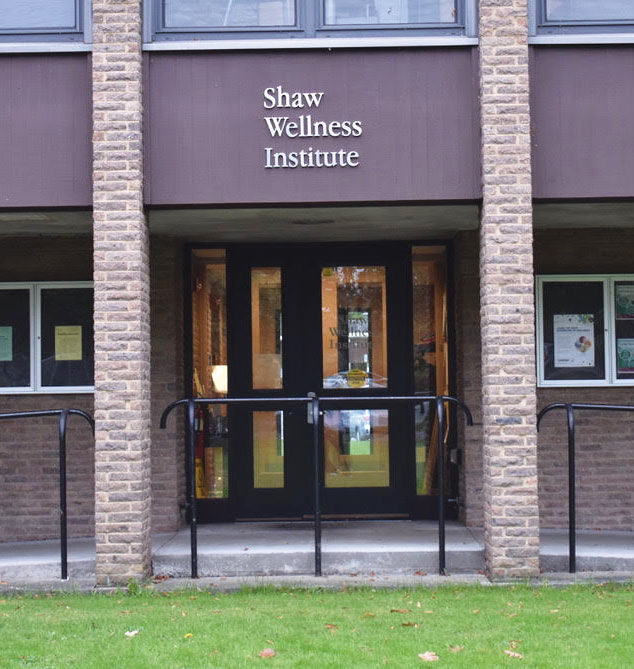Shaw Wellness Launches New Bystander Intervention 2.0 Program
The Shaw Wellness Institute at Colgate University launched a Bystander 2.0 supplement program for student leaders, which they are currently piloting. Shaw Wellness runs the Bystander Intervention program for all first-year students at Colgate and provides a multitude of resources for students when it comes to practicing healthy lifestyles for the mind and body.
Vicki Coates serves as the Program Coordinator of Shaw Wellness Institute, and part of her job is to run the Bystander Intervention Program. She’s in charge of hiring new facilitators, teaching them the curriculum and providing education and supervision. Katie Griffies serves as the Director of the Shaw Wellness Institute. Her new role in the Bystander Intervention Program is to provide the best practice resources for facilitators to use.
Coates and Griffes outlined what the overarching goals of the Bystander program are and spoke about the program’s history at Colgate. They also relayed information regarding the creation process, how it differs from the original program and what they had hoped to accomplish through these changes.
“Bystander Intervention is a program aimed at educating students on how to be an active bystander in potentially dangerous and criminal situations. Bystander 1.0 is specifically geared toward the topic of sexual violence and how to intervene in a scenario in which sexual violence might occur. Our presentation comes from ‘Bringing in the Bystander’ curriculum out of the University of New Hampshire. We hope to create a safer, more inclusive campus life by showing that each and every student has a responsibility to step in when a situation looks potentially dangerous, while ensuring they have the proper skill set to do so. We have worked hard over the last several months to update the content with the most recent data, stats, applicable examples and scenarios, as well as videos,” Coates and Griffes said in a joint statement.
Coates and Griffes then discussed how they created the program’s curriculum, which goes deeper into sexual assault prevention then the 1.0 program all first-year students complete during their first semester.
“We heard from students and student groups across campus that they wanted a refresher course on how to be an active bystander in potential sexual violence situations,” Coates and Griffies said. “Our goal for this presentation is to not only remind students of the skills to be an active bystander, but also build empathy for survivors, encourage a better understanding of populations most at risk for being assaulted, and continue encouraging every student to take on the responsibility of making Colgate a safer community.”
According to Coates and Griffes, Shaw is launching four new Bystander workshops to be piloted in the Spring 2020 semester. The workshops will center around hazing, harassment and descrimination, bullying and alcohol use.
“These presentations are structured in the same format as Bystander 1.0 and 2.0, with the intention of giving students the skills to recognize problematic behavior and provide the skills for students to intervene. These workshops will be scheduled consistently throughout the semester, but will also be available by request for any student group or organization. The workshops will count toward PE Wellness Passport hours, and if a student participates in all 5 workshops (including Bystander 2.0) and completes a final reflection, they will earn an Active Bystander Certification,” Coates and Griffes said.
Senior Carolyn Robb serves as a Bystander Intervention Intern at Shaw, where she gives bystander presentations to FSEM groups twice a week throughout the semester alongside a co-facilitator. Robb spoke about the changes the 2.0 program brings forth and the value of these changes.
“As Bystander 1.0 is required for every first-year student, 2.0 works to reemphasize its goals while adding a layer of self-accountability and deeper empathy for others. While those who take Bystander 1.0 are new to Colgate and have not experienced the campus climate for that long yet, 2.0 is meant for upperclassmen who may now be part of groups on campus, have their place, and understand the different dynamics of Colgate,” Robb said.
Robb said she feels aspects of the 2.0 curriculum will help change problematic cultures that exist on campus.
“The major difference, in my opinion, from 2.0 stems from one of the activities in the presentation where we ask each student to put themselves in the shoes of a survivor of sexual assault and examine the dimensions of their lives that may change as a result. Based on this activity, we challenge students to hold themselves and members of their groups accountable and dedicated to making a change on campus by challenging the dominant norms of hookup and rape culture,” Robb said
Sophomore Keith Brown serves as the Recording Secretary for SGA’s Senate. Brown spoke about his personal experiences participating in the Bystander programs and what changes he has noticed this semester when he participated in the 2.0 pilot.
“I definitely had a much more positive experience with the new 2.0 program compared to its previous iteration. One of my favorite elements of the new program was the post-it note exercise, which did a great job of illustrating how sexual assault can impact every aspect of your life, from your academics to your personal life, and also why it can be so difficult for survivors to discuss their assault with authorities. The new program definitely relies much more on visual media, like the online poll we took, and statistics to inform students about sexual violence and ways to prevent it, which I found much more impactful and informative than the previous program” Brown said.
Wynter Schnell is a junior from Pound Ridge, New York concentrating in political science with a minor in anthropology. He’s served as a news reporter...







